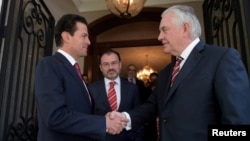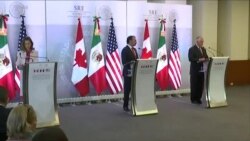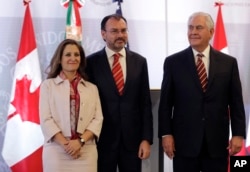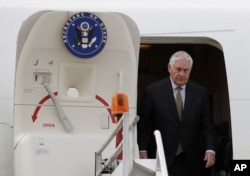ລັດຖະມົນຕີຕ່າງປະເທດສະຫະລັດ ທ່ານເຣັກສ໌ ທິລເລີສັນ ກ່າວຢູ່ທີ່ປະເທດເມັກຊິໂກ
ໃນວັນສຸກວານນີ້ວ່າ ພວກຄົນເຂົ້າເມືອງນຳເອົາ “ຄຸນຄ່າຢ່າງຫຼວງຫຼາຍ” ມາສູ່ສະຫະລັດ
ແຕ່ໄດ້ກ່າວເພີ້ມວ່າ ລັດຖະບານສະຫະລັດບໍ່ມີ “ການປະຕິບັດທີ່ດີ” ໃນການຄວບຄຸມ ຜູ້ຄົນເຂົ້າມາອາໄສຢູ່ໃນປະເທດ.
ຫລັງຈາກປະຊຸມກັນຢູ່ນະຄອນເມັກຊິໂກຊີຕີ້ ກັບລັດຖະມົນຕີຕ່າງປະເທດເມັກຊິໂກ
ທ່ານຫລຸຍ ວີເດີກາເຣ ແລ້ວ ທ່ານທິລເລີສັນ ກໍກ່າວຕໍ່ບັນດານັກຂ່າວວ່າ ສະຫະລັດໄດ້
ວາງ “ກົນໄກໄວ້ຫລາຍໆຢ່າງ” ໃນຫລາຍປີທີ່ຜ່ານມາ ເພື່ອຄວບ ຄຸມພວກຄົນເຂົ້າເມືອງ
ແຕ່ບໍ່ໄດ້ “ກັບຄືນໄປກວດກາເບິ່ງ.”
ທ່ານທິລເລີສັນ ກ່າວວ່າ “ຂໍໃຫ້ເປັນທີ່ແນ່ນອນວ່າ ພວກເຮົາມີລະບົບຢູ່ແລ້ວ ບ່ອນທີ່
ພວກເຮົາເຂົ້າໃຈວ່າ ມີໃຜແດ່ເຂົ້າມາໃນປະເທດ.”
ທ່ານກ່າວວ່າ ພວກຄົນເຂົ້າເມືອງຢູ່ໃນສະຫະລັດ ໄດ້ກາຍ “ເປັນເລື່ອງທີ່ຄວບ
ຄຸມບໍ່ໄດ້” ຊຶ່ງທ່ານກ່າວວ່າ ເປັນຫຍັງປະທານາທິບໍດີດໍໂນລ ທຣໍາ ກຳລັງຊຸກຍູ້ໃຫ້ລັດ
ຖະສະພາ “ແກ້ໄຂຂໍ້ຂາດຕົກບົກຜ່ອງເຫຼົ່ານີ້ ທີ່ໄດ້ເກີດຂຶ້ນໃນໄລຍະຫຼາຍປີທີ່ຜ່ານມາ.”
ລັດຖະບານເມັກຊິໂກໄດ້ສະແດງການຄັດຄ້ານຊໍ້າແລ້ວຊໍ້າອີກ ຕໍ່ຂໍ້ສະເໜີຂອງທ່ານ
ທຣຳ ທີ່ີຈະຫລຸດພວກຄົນເຂົ້າເມືອງຜິດກົດໝາຍ ແລະໃຫ້ເມັກຊິໂກຈ່າຍຄ່າກໍ່ສ້າງ
ກຳແພງຊາຍແດນ.
ຄວາມແຕກຕ່າງກັນກ່ຽວກັບບັນຫາດັ່ງກ່າວນີ້ ກໍບໍ່ໄດ້ເຮັດໃຫ້ທ່ານວີເດີກາເຣຢຸດ ການ
ຍ້ອງຍໍສະຫະລັດ. ທ່ານກ່າວວ່າ ຄວາມສຳພັນ ຂອງລັດຖະບານເມັກຊິໂກ ກັບລັດຖະ
ບານປະທານາທິບໍດີທຣໍາ ແມ່ນ “ແໜ້ນແຟ້ນ" ກວ່າ ທີ່ໄດ້ມີມາ ກັບລັດຖະບານ ອະດີດ
ປະນາທິບໍດີີ ບາຣັກ ໂອບາມາ. ທ່ານວີເດີກາເຣ ໄດ້ຮັບຮູ້ວ່າ ປະເທດທັງສອງ “ມີຄວາມ
ແຕກຕ່າງກັນຈຳນວນນຶ່ງ” ແຕ່ກໍກ່າວວ່າ “ພວກເຮົາກຳລັງເຮັດວຽກຢ່າງໃກ້ຊິດ ແລະ
ພວກເຮົາເກືອບເຫັນຜົນແລ້ວ.”
ທ່ານທິລເລີສັນ ໃນເວລາຕໍ່ມາ ໄດ້ພົບປະແບບປິດລັບ ໃນວັນສຸກວານນີ້ກັບປະທານາ
ທິບໍດີເມັກຊິໂກ ທ່ານອັງຣິກເກ ເປຍາ-ນີເອໂຕ ໃນຂະນະທີ່ຄວາມສຳພັນຂອງປະເທດ
ທັງສອງພວມຊຸດໂຊມລົງໂດຍການຂົ່ມຂູ່ຂອງສະຫະລັດທີ່ຈະຖອນ ໂຕອອກຈາກຂໍ້ຕົກ
ລົງການຄ້າເສລີໃນເຂດອາເມຣິກາເໜືອ ຫລື NAFTA ລະ ຫວ່າງສະຫະລັດ ເມັກຊິໂກ
ແລະການາດາ. ພວກທ່ານໄດ້ຮ່ວມສົມທົບໂດຍ ທ່ານວີເດີກາເຣ ແລະລັດຖະມົນຕີຕ່າງ
ປະເທດການາດາ ທ່ານນາງຄຣິສເຕຍ ຟຣີແລນ.
ການຢ້ຽມຢາມເມັກຊິໂກຂອງທ່ານທິລເລີສັນ ເປັນບ່ອນຢຸດແວ່ແຫ່ງທຳອິດຂອງການເດີນທາງຢ້ຽມຢາມອາເມຣິກາລາຕິນ ທີ່ຈະນຳພາທ່ານໄປຍັງອາເຈັນຕິນາ ເປຣູ ແລະ
ໂຄລອມເບຍ ພ້ອມດ້ວຍບ່ອນແວ່ແຫ່ງສຸດທ້າຍທີ່ ຈາໄມກາ ໃນວັນທີ 7 ກຸມພາ.
United States Secretary of State Rex Tillerson said in Mexico on Friday that immigrants bring "enormous value" to the U.S., but added the U.S. government lacks "good discipline" in regulating who enters the country to live.
After meeting in Mexico City with Mexican Foreign Secretary Luis Videgaray and Canadian Foreign Minister Chrystia Freeland, Tillerson told reporters the U.S. has put "many mechanisms in place" over the years to control immigration, but has "never gone back to clean this up."
"Let's make sure we have systems in place where we understand who's coming into the country," Tillerson said. He said immigration in the U.S. has "gotten out of normal order," which is why President Donald Trump is pushing Congress to "fix these defects that have risen over the years."
The Mexican government has repeatedly expressed opposition to Trump's proposals to curb illegal immigration and have Mexico pay for a reinforced border wall.
Differences over the issue did not preclude Videgaray from praising the U.S. He said the Mexican government's relationship with the Trump administration is "closer" than it was former President Barack Obama's administration. Videgaray acknowledged the two countries "do have some differences" but said "we are working closely and we are about results."
Tillerson later held a closed-door meeting with Mexican President Enrique Pena Nieto during a time when relations have also been strained by U.S. threats to pull out of the North American Free Trade Agreement (NAFTA).
NAFTA, which Trump alleges costs American jobs, was discussed at the trilateral meeting, along with energy development and drug interdiction.
Tillerson's visit to Mexico is the first stop on a six-day trip through Latin America that will also take him to Argentina, Peru and Colombia, with a final stop in Jamaica on February 7.
Before embarking on his trip, Tillerson delivered a speech Thursday at his alma mater, University of Texas at Austin, during which he warned that China and Russia are assuming "alarming" roles in Latin America and urged regional powers to work with the U.S. instead.
"Latin America doesn't need new imperial powers that seek only to benefit their own people," Tillerson said. "China, as it does in emerging markets throughout the world, offers the appearance of an attractive path to development, but in reality this often involves trading short-term gains for long-term dependency.''
He also derided Russia for selling weaponry to unfriendly, authoritarian governments in the region.
After visiting Buenos Aires and the Argentine mountain resort town of Bariloche, Tillerson is scheduled to meet in Lima with Peruvian President Pedro Pablo Kuczynski on various issues, including the eighth annual Summit of the Americas, which is to be held April 13-14 in Lima, Peru.
In Colombia, Tillerson plans to meet with President Juan Manuel Santos and other officials. They're expected to discuss not only Venezuela but also "the surge in coca cultivation and cocaine production, economic issues and the growing refugee population" from neighboring Venezuela, the State Department said.
Tillerson is also expected to rally the region's governments in pressing democratic reforms in crisis-ridden Venezuela.
Sanctions
The United States will use "all its political, diplomatic and economic tools to address the situation in Venezuela," a senior State Department official said at a briefing this week on the trip.
Venezuela is in its fifth year of a worsening political and economic crisis.
In January, the U.S. Treasury Department added four current or former Venezuelan senior military officials to its sanctions list, accusing them of corruption and repression that have contributed to critical shortages of food and medicine and the erosion of human rights. The European Union also has imposed sanctions, and the Organization of American States' secretary general, Luis Almagro, has championed democratic reforms for Venezuela.
On Thursday in Texas, Tillerson said the administration was not advocating for a "regime change" in Venezuela. He did, however, say it would be "easiest" if President Nicolas Maduro chose to leave power on his own.
Maduro, who accuses the United States of leading an international effort to topple his socialist administration, announced in January that he would seek a second six-year term and called for an election by April 30.









